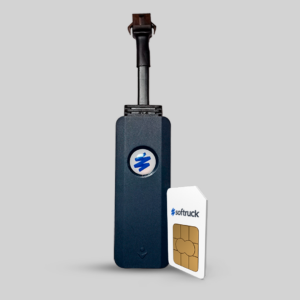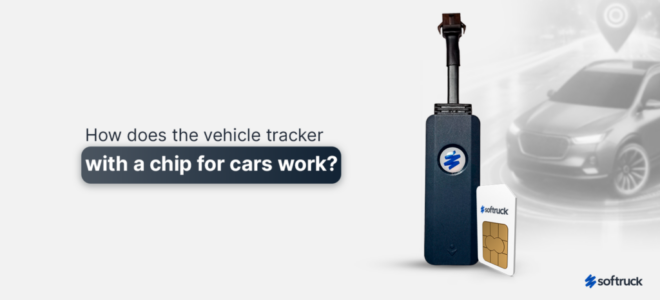How does the vehicle tracker with a chip for cars work?
In the world of vehicles, security and asset control are absolute priorities for owners and companies, whether they are tracking, insurance, vehicle protection, or fleet management companies.
A very common question in this case is how the vehicle tracker with a chip works, as these technologies are fundamental in this market, being more effective in ensuring this security.
But how exactly does this technology work? Let’s explore the main aspects, including the differences between trackers with and without a chip, the specific advantages of cellular chip trackers, and the crucial role of the chip in car location.
What is a Car Tracking Chip (M2M Chip)?
A car tracking chip is a device that uses mobile network technology to monitor the location of a vehicle in real time. These chips are similar to those used in our cell phones, allowing continuous communication with cell towers and consequently transmitting location data to a central server.
In the case of car chips, they are commonly known as M2M (Machine-to-Machine) Chips.
These chips are revolutionizing the way we monitor and manage vehicles, providing a range of benefits that go beyond traditional tracking.
Therefore, M2M chips operate similarly to conventional SIM cards used in smartphones, but with some key differences that make them ideal for IoT (Internet of Things) and M2M applications.
They are designed to withstand extreme conditions, operate for long periods without maintenance, and offer more robust and secure connectivity.
How Does the Vehicle Tracking Chip Work?
The way this chip works in the daily operation of vehicle tracking is basically:
- Installation in the Tracking Device: The M2M chip is installed in the vehicle tracking device, allowing it to connect to the telecommunications network.
- GPS Signal Reception: The tracking device captures GPS satellite signals to determine the exact location of the vehicle through commands sent by the installer via SMS to the chip to start reporting.
- Data Transmission: Using the M2M chip, location data and other relevant information are transmitted in real-time to Softruck’s monitoring center.
- Monitoring and Analysis: The received data is processed and analyzed, allowing continuous and real-time monitoring of the vehicle. In addition to real-time data, Softruck’s platform also generates reports with various relevant information for the management of your operation.

What are the use cases of M2M chips?
The application of M2M chips in vehicle tracking covers a wide range of scenarios, from monitoring private vehicles to managing large commercial fleets. Here are some of the main applications:
- Fleet Management: Logistics and transportation companies use M2M chips to monitor location, performance, and driver behavior in real-time, improving operational efficiency and safety.
- Vehicle Security: Private vehicle owners can use M2M chips to ensure the security of their cars, receiving alerts in case of suspicious movements or theft attempts.
- Telematics: Besides location, M2M chips allow the collection of telemetric data such as fuel consumption, speed, and engine condition, aiding in preventive maintenance and reducing operational costs.
- Car Sharing Services: Car sharing and rental companies use M2M chips to monitor vehicle usage, ensure availability for users, and optimize resource allocation.
Advantages of Vehicle Tracker with Cellular Chip
The use of M2M chips in vehicle tracking offers several significant advantages for both individual vehicle owners and fleet managers. Here are some of these advantages:
- Reliable and Stable Connectivity: M2M chips are designed to ensure continuous and reliable connectivity, even in areas with weak cellular signals. This is crucial for real-time vehicle tracking, regardless of location.
- Durability and Resistance: These chips are built to withstand harsh conditions, including extreme temperatures, vibrations, and humidity, making them ideal for use in vehicles that face tough environments.
- Data Security: M2M chips offer advanced security features to protect transmitted data, including encryption and authentication, ensuring that sensitive information is safeguarded against unauthorized access.
- Energy Efficiency: Designed to consume less power, M2M chips help extend the battery life of tracking devices, reducing the need for frequent maintenance.
- Remote Management: M2M technology allows for the remote management of tracking devices, including firmware updates and configuration, facilitating maintenance and technical support.

Comparison with Vehicle Tracker Without Chip
Vehicle trackers without chips, or those based solely on GPS, have more limited functionality. They rely exclusively on GPS satellite signals and, while they can provide exact location, they cannot transmit this information without an internet connection or mobile network.
This means that in areas without network coverage, the tracker without a chip may lose connection, making it less effective in critical situations.
Main Disadvantages of Trackers Without Chip:
- Dependence on Connection: Without a cellular chip, the device cannot transmit data in real time, limiting its effectiveness.
- Limited Coverage Area: In areas without internet access, such as rural zones or underground, the tracker may not function correctly.
- Fewer Features: Trackers without chips generally have fewer additional features, such as real-time alerts and remote monitoring.
The Role of the Location Chip for Cars
The location chip for cars is the central piece that enables communication between the tracker and the mobile network. It is responsible for capturing the GPS signal and transmitting it, allowing continuous and efficient tracking of the vehicle. This chip is configured to work in various conditions and ensure the highest possible accuracy, essential for security and fleet management.
Location Chip Features:
- Continuous Communication: Maintains connection with the mobile network to ensure continuous data transmission.
- High Accuracy: Captures signals from multiple GPS satellites to provide precise location.
- Energy Efficiency: Designed to consume low energy, extending the device’s battery life.
- Robustness: Reliable in various weather conditions and environments, ensuring consistent performance.
Conclusion
Vehicle tracking technology with a chip for cars is a robust and efficient solution for monitoring and security.
Whether for individual owners or logistics companies, using a vehicle tracker with a cellular chip offers comprehensive coverage and real-time updates, surpassing the limitations of devices that do not use chips. Thus, investing in this technology ensures more security, control, and peace of mind in daily life.
The benefits are clear: from increased security to operational cost savings, trackers with chips represent a significant advancement in vehicle management.
With the ability to monitor in real time, owners and fleet managers can make informed and quick decisions, promptly responding to any situation that requires immediate attention.

